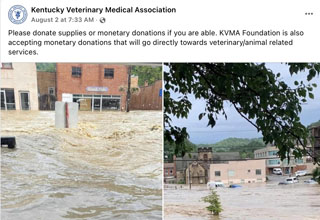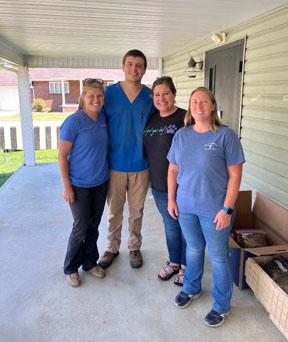crated animals

VIN News Service screenshot
The Kentucky Veterinary Medical Association shared flood images on Facebook last week, requesting donations to the group's
charitable foundation. "So much of what is being done, the veterinarians are doing it pro bono," said KVMA Executive Director Debra Hamelback. "Our foundation dollars will be going toward veterinary care."
As deadly flash floods consumed parts of eastern Kentucky, a Great Pyrenees named Jacks helped to alert his family and guide them to higher ground.
The gesture was among the dog's final acts of loyalty and kindness.
Jacks took his last breath roughly 24 hours later, on July 29, while displaced and temporarily boarding at his veterinarian's practice. The loss weighs on the dog's veterinarian, Dr. William Hagans, who owns one of two veterinary practices in Perry County and has had a front-row seat to the devastation there.
The dog, Hagans said, appeared to be resting, showing no signs of distress.
"In my mind, I'm throwing out all the differentials," he said in an interview this week with the VIN News Service. "How do you pick up weakness in a Pyrenees that lays around and sleeps all the time? This was his normal behavior. There was no vomiting, no regurgitation. He was eating. Was the swimming too much for him? It's just heartbreaking."
Between July 25 and July 30, thunderstorms brought heavy rain, dumping up to 10.5 inches of water on eastern Kentucky in one 48-hour period. The deluge spurred flooding across seven counties. Large swaths of some communities, including homes and farms, were swept away, prompting Gov. Andy Beshear to sign a state of emergency, declaring the disaster to be "one of the worst, most devastating flooding events" in the state's history. At least 39 people are confirmed to have died, and some are still missing. Untold numbers of livestock have perished across the mostly rural region.
Reflecting on the fact that his own home and practice were spared, Hagans grieves for those who've lost everything: "I have a friend who was trying to pull her horses to safety, and they all got swept away. And that same friend then went to rescue a neighbor and only got the grandson out before they both watched as the trailer was washed away with his grandparents inside.
"I have a technician who lost her home and both her vehicles," he continued. "Her brother lost his home, too, and while checking in on a neighbor, he fell through their floor, cut his leg, got sepsis and now is in ICU. In some way, this disaster has touched everybody."
CNN featured the plight of Hagans' technician, Belinda Asher, in a news story, and nearly $14,000 has been raised via a GoFundMe campaign that's dedicated to helping her family. Pretty much everyone in Hagans' one-doctor practice has volunteered to help the displaced, drop off food and supplies at distribution centers or aid cleanup efforts. Between family duties, running a practice and volunteering in the community, Hagans is stretched to his limit. Almost nightly, he's up past 1 a.m., charting the day's medical cases.
Much of his caseload, he said, is now pro bono work: "People lost their homes but were able to save their animals, and now I have them. Some need medications, [and] they're unable to pay. A lady who lost her home was asleep in her car when I went out to get her puppy, who has [parvovirus]. I took it and paid for it, but you can't keep the doors open that way."
Flood waters have receded, but power outages are expected to continue for weeks. For now, local governments are housing animals anywhere they can, such as state parks, schools and even a grooming facility. Last week, the American Veterinary Medical Foundation, a charitable arm of the American Veterinary Medical Association, pledged $25,000 in aid to Kentucky in support of those who provide emergency veterinary care, food, boarding and supplies. Multiple organizations, too, are providing support to flood victims, including the Kentucky Humane Society and the governor's office, which established the Team Eastern Kentucky Flood Relief Fund to collect tax-deductible donations for the funerals of flood victims.
staff

Photo courtesy of Dr. Lauren Mirus
Dr. Lauren Mirus (right) joined Auburn University veterinary student Ben Cornett, Tara Ritchie, owner of Waggin' Tails Pet Resort, and Dr. Laura Howard, owner of West Liberty Veterinary Clinic, to examine the 70 or so displaced pets at Waggin' Tails, a grooming facility in Whitesburg, Kentucky.
A 45-minute drive south of Hagans' practice is Dr. Lauren Mirus in Morgan County, where damage is extensive. But harder hit is the area of Jackson, Kentucky, which is home to the practice's satellite clinic.
"You see pictures and stuff, but until you see it with your own eyes, you can't imagine it," she said of the destruction. "It's mind-blowing."
It's easier to take stock of the damage, she said, now that flood waters are receding. "Fences have been wiped out, so some of the horses have gone up to the strip mines [on hilltops] and are surviving; others were hauled off to Lexington [a two-hour drive west]," Mirus said. "I know one of our clients is having to use an ATV to take gallons of water up to her five horses because she has no water source. That's 50 gallons a day."
Everyone in the seven-doctor practice is helping with relief efforts. The focus, Mirus said, is digging out from what's become a muddy, debris-filled mess: "We all have one day off a week, and that's when we're going out to volunteer our services. The debris — it isn't just clothes and trash; it's school buses and firetrucks, equipment, tractors and vehicles. Where there were once houses, now there is nothing but concrete slabs."
Mirus said that a veterinarian she practices with lost her home. She was at work when she received a call that flood waters were rising. Eventually, they got so high, only the roof was visible.
"She just graduated from vet school in May," Mirus said of her colleague. "She and her husband were living with his parents, so he's lost his childhood home. It's just devastating."
The only bright spot, Mirus said, has been watching the community come together. "It's heartwarming to see everyone lending a hand. Even in terrible circumstances, it's been good to see that."
Dr. Jordan Thacker drives from her practice in Pikeville to examine and vaccinate animals that are temporarily housed at the Floyd County Community Center and Jenny Wiley State Resort Park. She also visits the Floyd County Animal Shelter, which is in the heart of the flood region.
Along the way, she's been struck by the strength of the human-animal bond and what pets mean to their owners in times of desperation. She reflected on a man whose home had taken on five feet of rising water, yet he still managed to get inside to carry out his little dog.
"People say a lot about eastern Kentucky, but when it comes to devastation, we always try to pull together," she said. "And we love our animals."